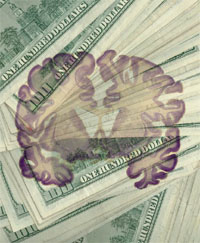December 09, 2006
Should Economics be Part of Hard SF?
 An interesting set of criticisms of Charles Stross Accelerando, Can the Future Do Without Economic Logic? from Tim Swanson and Isaac Bergman (published by the von Mieses Institute). Essentially the problem is that Stross' economics isn't hard enough.
An interesting set of criticisms of Charles Stross Accelerando, Can the Future Do Without Economic Logic? from Tim Swanson and Isaac Bergman (published by the von Mieses Institute). Essentially the problem is that Stross' economics isn't hard enough.
Compared to most sf Stross gets economy. How many absurd mining planets have we not be subjected to? Time travel business ideas? Interstellar trade is tricky to make realistic and most cyberpunk megacorps would be outcompeted within months. But I think Robin Hanson is right when he thinks that hard sf economy can be done.
Is it just me, or are the demands of hard sf rising? Once you just had to get the physics right, you could assume nearly any weird biology. Gradually sf authors have begun to build ecologies more conscientously and make sure their aliens could have evolved. These days software is slowly getting more plausible. And maybe hard sf is starting to integrate more real economics too. Maybe a true hard sf author in 2020 will have to master not just physics, biology, computer science, economics, sociology, psychology - and write well, of course. We better invent brain enhancements quickly if we are to get anybody with that kind of expertise.
Is a Hypereconomy Stable?
I'm not entirely convinced by the claim that a superintelligent free market would approach the evenly rotating economy and hence become stabler over time.
First, in Stross story Economics 2.0 was not a free market economy, so the objection is invalid.
But even a free market economy might get sufficient bumps by the rapid growth of the posthuman intelligences inside it. Plateaus and breakthroughs in developing whatever software the entities desire/are would introduce noise, and it seems to me that it is not clear at all that a rapidly smarter population (with possibly exponentially growing differences in smartness) would be evenly rotating. Misallocations and adjustments can still occur if they are impossible for intelligences of level X to foresee but obvious for level X+1 (or X+100) intelligences.
I don't think anybody has applied Austrian school economics to distributed societies like Alexander Chislenko's functional soup. If identity is not stable and desires and goals generated from each other and economic demands, how does the economic cycles behave?
Reputation Markets
The critique of the reputation markets seems to be constructive. I guess what we really want is a measure that tells us important things about an entity like trustworthiness, integrity or influence. It really seems to be not just a vectorial variable but better regarded as a tagged one - a reputation as fun might be essential for a comedian and mis-applied to a company. It is not a unitary scalar thing that can be used as money (at least not easily). In different situations different aspects become relevant and can be used in different ways - scientific integrity and expertise ought to be used to judge the epistemic importance of scientific claims in public debate and publication decisions in peer review, but they are rather pointless in a business deal.
We want some way of automatically calculating reputation scores that aggregates the knowledge of many people, and that suggests a market, but it could just as well be something else. If reputations are regarded as more multifaceted than just a single good/bad reputation there would be more parallel and weakly connected markets, which likely would reduce their predictive power. Maybe this is actually an argument for why we need to have low-dimensional reputation scores: they are more stable and calculable than detailled reputations. On the other hand reputations based on agent software doing text/video mining of comments and events might actually calculate new reputation scores on the fly ("Agent, what is his integrity as a green-christian-antifeminist? Is it higher than his trustworthyness as a liberal eugenicist?") And this could be stabilized by getting publicly stated reputation estimates from other individuals, weighing them together by pageRank of social networks.
To me it suggests that reputation markets and other forms of aggregation might be a very good area to study both from an economic perspective and as cognitive enhancement. As stated in the Manifesto for the Reputation Society reputations are a way of dealing with information overload. There might also be public goods problems associated with getting people to formulate reputations and situations where reputations reduce market efficiency, another reason to get economists involved.
Posted by Anders3 at December 9, 2006 09:51 PM